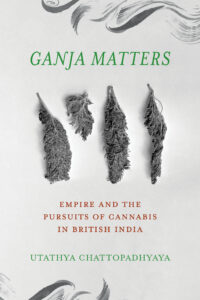I research, study, and teach the social and cultural history of modern South Asia (1765-1947) and the British Empire in the modern world (1830-1960) and work in three inter-related areas: social histories of agrarian life in South Asia, histories-from-below of the British Empire, and critical histories of addiction and drugs.
My ongoing research on the comparative and global history of drugs, agricultural commodities, labor, and imperialism in the 19th and 20th century connects situated agrarian histories of South Asia with imperial histories of law, taxation, and knowledge. I focus on labor, gender, caste, species, and race as critical themes of analysis that build on materialism and anti-imperialism in social history, political economy, multispecies thinking, and plant studies. My current work examines how rural geographies, agrarian social life, sacral cosmologies, imperial print culture, and practices of state formation were continuously shaped by substances and pursuits of intoxication.
My undergraduate courses include introductory surveys of South Asian history, commodity history, and upper division classes on public culture which combine a focus on commodities and capital, drugs and medicine, labor history, peasant politics, popular culture, social movements, and gender and empire. My graduate-level courses cover global and transnational approaches to South Asian history, empire and decolonization, historical methods, and the history of the Indian Ocean World.
I am also an editor of the Social History of Alcohol and Drugs (University of Chicago Press) and collaborate on multiple ongoing projects on addiction, plant studies, multispecies methods, and archival preservation.
- Modern South Asia
- British Imperial History
- Drugs History
- Agrarian Studies
- Commodity History
- Indian Ocean World/World History
- Plant Studies
- Internationalism and Marxism
- Bombay: Empire, Urban Drugscapes, and the Cultural Politics of Drugs 1947-95

Ganja Matters: Empire and the Pursuits of Cannabis in British India (Oakland: University of California Press, forthcoming)
Articles
- “Ganja and the Godhead: Plant Matter and the Sacral Binds of the Excise Principle in British India,” in Samantha Frost, Renisa Mawani, and Antoinette Burton eds. Biocultural Empire: New Histories of Imperial Life Worlds (London: Bloomsbury, 2024): 109-34.
- ‘Colonial Capitalism and British Imperialism’ in Interrogating Colonial Documents and Narratives (Marlborough: AM, 2024)
- “Bodies that Cohere: Notes on Ganja and Gender in Colonial India” Indian Journal of Gender Studies 30.1 (2023): 55-77.
- “Reading Cannabis in the Colony: Law, Nomenclature, and Proverbial Knowledge in British India,” Social History of Alcohol and Drugs 36. 2 (2022): 201-37. Interviewed in “Cannabis narratives in British India,” Points – The Blog of the Alcohol and Drugs History Society, 6 Oct 2022.
- “A Primer for Rebellion: Indian Cannabis and Imperial Culture in the Nineteenth Century,” English Language Notes 60.1 (2022): 101-21.
- “Vulture,” “Xerus,” and “Unicorn” in Renisa Mawani and Antoinette Burton eds. Animalia: An Anti-Imperial Bestiary for Our Times (Durham: Duke University Press, 2020)
- “Dagga and Prohibition: Markets, Animals, and the Imperial Contexts of Knowledge, 1893–1925,” South African Historical Journal 71.4 (2019): 587-613. Abridged in “Cannabis in South Africa: The Duplicity of Colonial Authorities,” The Conversation – Africa, 4 Feb 2020; Points – The Blog of the Alcohol and Drugs History Society, 7 Apr 2020.
- “Labor: Identities and Time under Empire” in Kirsten McKenzie ed. A Cultural History of Western Empires in the Age of Empire 1780-1920, (London: Bloomsbury, 2018), 119-146.
- “Talking History: E.P. Thompson, C.L.R. James, and the Afterlives of Internationalism,” Historical Reflections/Réflexions Historiques, 41(1), 2015. Republished in Fortado and Burton eds. Histories of a Radical Book: E.P. Thompson and the Making of the English Working Class, New York: Berghahn, 2020, 113-30. Book Roundtable: “Histories of a Radical Book: A Roundtable Conversation on Empire, Colonialism, and E.P. Thompson’s Making,” Journal of Colonialism and Colonial History 22 (2), 2021.
- “Time to move on?” Kritik, June 26, 2014.
Reviews
- “Review. Lucas Richert and James Mills eds., Cannabis: Global Histories,” Journal of Colonialism and Colonial History 23(1), 2022.
- “Review. Samia Khatun, Australianama,” American Historical Review 125(4), 2020, 1408-09.
- “Review. Benjamin Breen, The Age of Intoxication,” Journal of British Studies 60(2), 2021, 440-41.
- “Empire and Indifference,” Victorian Literature and Culture 47(4), 2019, 835-42.
- “Review. Stolte and Schrikker eds. World History: A Genealogy,” Itinerario 43(2), 2019, 369-71.
2025-6: Fall 2025
- HIST 9 – Commodity Histories
- HIST 282G – Global South Asia
Previous Courses:
- HIST 88 – Survey of South Asian History
- HIST 203A/B – Graduate Research Seminar in Comparative History
- HIST 202EPA – Epistemology, Power, Archives
- INT 187AM – Race, Colonialism, and the Co-Operative
- HIST 189M – South Asian Public Culture
- HIST 201C – South Asia and the Indian Ocean
- HIST 202 – Historical Methods
- HIST 282E – Empire and Decolonization in South Asia
- INT 84CX – Plant, Drug, Weed: Cannabis and World History
- 2024 Margaret T. Getman Service to Students Award, UC Santa Barbara
- 2023 Faculty Fellowship, Interdisciplinary Humanities Center, UC Santa Barbara (2023-24)
- 2022 University of California Regents Humanities Faculty Fellowship (2022-23)
- 2021 Faculty Fellowship, American Council of Learned Societies (2021-22)
- 2020 UC Santa Barbara Faculty Career Development Award
- 2019 UCSB-Mellon Foundation Engaging Humanities Foundational Course Redesign Award
- 2016 Thomas and Barbara Metcalf Junior Research Fellowship in Indian History, American Institute of Indian Studies.
- 2015 Illinois Program for Research in the Humanities (IPRH) Prize for Research in the Humanities, University of Illinois.

